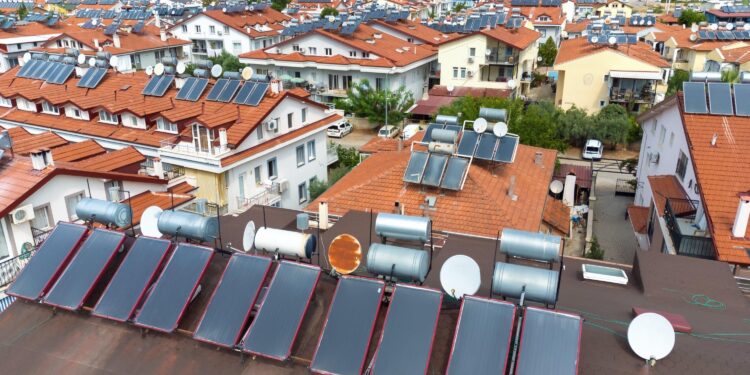TĂŒrkiye has made remarkable strides in enhancing its energy efficiency, outpacing the global average according to a recent statement from an International Energy Agency (IEA) official. As the world intensifies efforts to combat climate change and reduce energy consumption, TĂŒrkiye’s progress stands out as a significant achievement, reflecting the country’s commitment to sustainable development and economic resilience. This article delves into the key factors behind TĂŒrkiye’s energy efficiency improvements and explores the implications for both the domestic energy landscape and global environmental goals.
TĂŒrkiye Leads Global Energy Efficiency Gains Driving Sustainable Growth
TĂŒrkiye has emerged as a frontrunner in energy efficiency, outpacing the global average according to recent insights from an International Energy Agency (IEA) official. Over the past decade, the country has implemented ambitious policies and technological innovations that have significantly reduced its energy intensity across key sectors. These efforts have not only contributed to a substantial decline in energy consumption per unit of GDP but have also positioned TĂŒrkiye as a model for sustainable growth among emerging economies.
Key drivers behind TĂŒrkiye’s energy efficiency success include:
- Widespread adoption of smart grid technologies enhancing energy distribution
- Government incentives promoting renewable energy projects and green building standards
- Strategic investments in industrial modernization and energy-efficient manufacturing
- Public awareness campaigns fostering energy-saving behaviors at the consumer level
| Year | TĂŒrkiye’s Energy Intensity Reduction (%) | Global Avg. Reduction (%) |
|---|---|---|
| 2015-2020 | 18.5 | 11.2 |
| 2020-2023 | 12.3 | 7.1 |
As TĂŒrkiye continues to integrate advanced energy management systems and promote innovation in green technology, experts anticipate that the momentum will not only be sustained but accelerated. These measures are expected to foster resilient economic growth while fulfilling international climate commitments and increasing energy security for the nation.
Insights from IEA Official on Key Sectors Fueling TĂŒrkiye’s Energy Transformation
The International Energy Agency (IEA) official highlighted TĂŒrkiye’s rapid advancements in energy efficiency across pivotal sectors that have significantly contributed to its robust energy transition. Particularly, the industrial, transportation, and building sectors have demonstrated remarkable progress, outstripping the global average in energy savings. According to the IEA, TĂŒrkiye’s strategic investments in modern technologies and policy reforms have played a crucial role in optimizing energy consumption, reducing emissions, and fostering sustainability in these key areas.
Key factors driving this transformation include:
- Implementation of cutting-edge energy management systems in manufacturing plants
- Expansion of public transport networks and incentivization of electric vehicle adoption
- Comprehensive building retrofitting programs targeting insulation and smart energy controls
| Sector | Energy Efficiency Improvement (%) | Global Average (%) |
|---|---|---|
| Industry | 12.5 | 8.0 |
| Transportation | 10.3 | 6.5 |
| Buildings | 15.1 | 9.2 |
Policy Recommendations to Sustain and Accelerate TĂŒrkiye’s Energy Efficiency Momentum
To maintain TĂŒrkiye’s impressive strides in energy efficiency, policymakers must prioritize a multi-faceted strategy focused on innovation, regulation, and public engagement. Strengthening incentives for renewable energy investments and enhancing energy performance standards in both residential and industrial sectors are critical. Moreover, fostering collaboration between government agencies, private sector players, and research institutions will help develop cutting-edge technologies that reduce consumption and carbon emissions simultaneously.
A balanced approach includes:
- Expanded financial support for energy-efficient appliances and retrofitting projects;
- Robust educational campaigns to raise awareness among consumers and businesses;
- Enhanced regulatory frameworks to ensure compliance and transparency;
- Investment in smart grid technologies to optimize electricity use and distribution.
| Policy Area | Key Action | Impact Potential |
|---|---|---|
| Renewable Incentives | Tax credits & subsidies | High |
| Energy Performance Standards | Mandatory efficiency labels | Medium |
| Public Awareness | Nationwide education programs | Medium |
| Smart Infrastructure | Grid modernization projects | High |
Closing Remarks
TĂŒrkiye’s remarkable strides in energy efficiency underscore its commitment to sustainable development and climate goals, setting a benchmark that surpasses the global average. As highlighted by the International Energy Agency official, these improvements reflect not only technological advancements but also effective policy implementation. Moving forward, TĂŒrkiye’s continued focus on energy optimization could play a pivotal role in shaping the region’s energy landscape and inspiring further international collaboration.
















